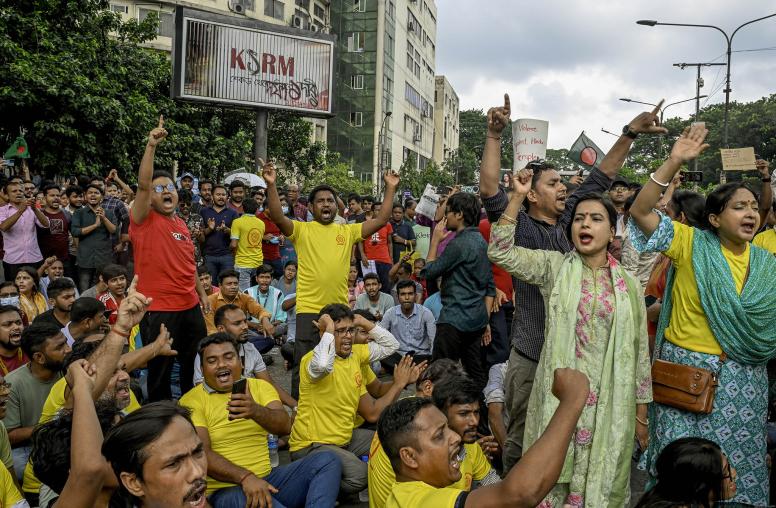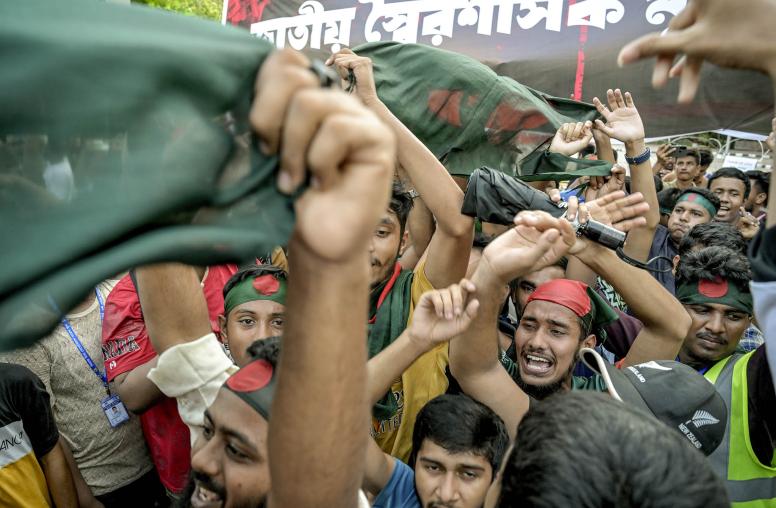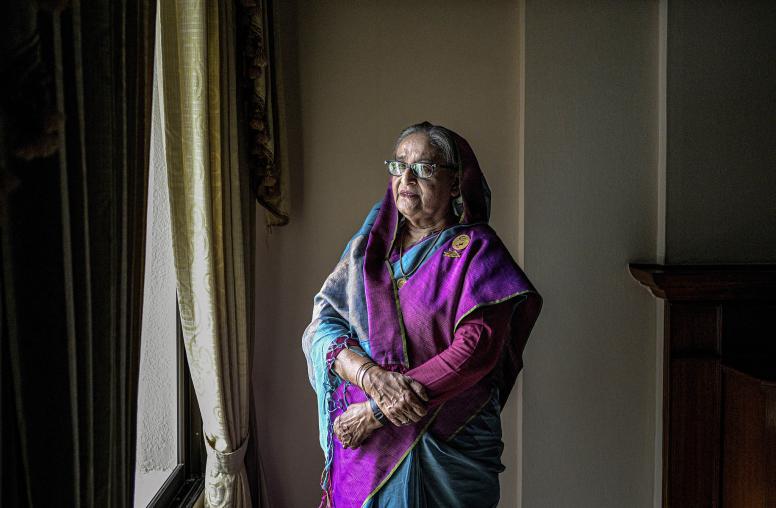How Climate Change Deepens Bangladesh’s Fragility
Policymakers must recognize that climate change is a long-term problem with short-term effects on human rights, governance and conflict.
The Intergovernmental Panel on Climate Change (IPCC) released its sixth report on the state of the earth’s climate in early August — and it paints a dire picture. The report argues that unless governments take appropriate measures to curb greenhouse gas emissions and spur behavioral change, the world is moving toward a climate crisis of rising sea levels, warmer temperatures and more extreme weather. The report’s findings are particularly relevant in Bangladesh, where low elevation, high population density and weak infrastructure make it highly vulnerable to climate change.

Over the last two decades, the Global Climate Risk Index rates Bangladesh as the seventh most affected country in the world from extreme weather events. Depending on the extent of sea level rise in the coming decades, an estimated 15 to 30 million Bangladeshis could be displaced from coastal areas, if not more. A 2018 U.S. government report noted that 90 million Bangladeshis (56 percent of the population) live in “high climate exposure areas,” with 53 million subject to “very high” exposure. The United Nations Children’s Fund’s 2021 Children’s Climate Risk Index rates the climate risk facing children in Bangladesh “extremely high”— the index’s most severe rating.
Amid the complex interaction of poverty and climate change, Bangladeshis in coastal communities have already begun migrating inland, mostly to urban areas. With weak local governance, poor urban management and existing ethno-religious tension driving underlying domestic fragility, climate-driven migration and poverty will drive or amplify conflict and human rights challenges. Bangladesh is one prominent example of why U.S. policymakers should adopt a robust climate strategy that accounts for the short-term effects of climate change on conflict, human rights and governance.
Unmanageable Urbanization
Urbanization has been a key part of Bangladesh's development strategy. Although most Bangladeshis still live in rural areas, the urban population has been on a steady rise since the country’s founding in 1971, as citizens seek economic and educational opportunities in better developed areas.
Over the last decade, the capital city Dhaka has been among the fastest growing cities in the world. Today, Dhaka’s population is estimated at over 20 million and projected to keep rising. But Bangladesh’s rapid urbanization has not been met with needed infrastructure improvements and environmental protections, which has deepened daily challenges.
The number of Bangladeshis living in poverty has been in steady decline since 2000, but recent studies suggest that extreme poverty is rising in urban Bangladesh — and that was before COVID-19, which drove a 20-point increase in poverty in 2020. The United Nations estimates that around four million people inhabit the city’s over 5,000 slums, which are continually fed by an influx of migrants, who are often forced to depart good-quality housing for abject conditions due to climate-related displacement. These slums have poor water and air quality and unsafe infrastructure that endanger their residents. Moreover, Dhaka is itself prone to floods that will likely become more common and severe with a changing climate.
As these areas swell, communicable disease is more likely to spread. Furthermore, as Dhaka’s formal and informal economies reach capacity, child labor, sex trafficking and child marriage — already serious problems in Bangladesh — will become more common.
Inflamed Communal Conflict
Rural Bangladesh has long experienced an undercurrent of anti-minority communal violence. Often linked to politics or “land grabbing,” minority groups, particularly Hindus and indigenous groups, have faced violence from Muslims. In recent years, the growing social influence of the Islamist group Hefazat-e-Islam and rise of majoritarian sentiment have led to increasing inter-religious tension. This has manifested in a growing number of anti-Hindu riots sparked by often-fake social media posts. A Bangladeshi human rights organization has documented over 4,000 attacks on minorities since 2007.
Climate change could exacerbate this problem. Bangladesh’s coastal divisions (i.e., provinces) have large Hindu populations. As displaced persons from these communities move into Muslim majority areas in Bangladesh, increased interaction and competition for jobs and land are likely to exacerbate tension and conflict.
Violent Extremist Recruitment
While the drivers of extremism in Bangladesh are manifold, poverty, food insecurity, unemployment and weak governance are among the factors that drive despair and provide fodder for terrorist recruitment.
In the early 2000s, a changing climate exacerbated drought and food insecurity in Rajshahi Division and the surrounding region, which contributed to the rise of the terrorist group Jamaatul Mujahedeen Bangladesh (JMB) and the country’s most notorious terrorist leader “Bangla Bhai.” In an area already prone to drought, the changing rainfall patterns and river-water diversion across the border in India extended the dry season, which left local residents without food for sustenance or export. Corrupt and weak local governance provided little support. JMB and Bangla Bhai took advantage of this situation to recruit supporters, drawing on funds from the Middle East to create charities for service provision and religious instruction. Bangla Bhai was able to create a small caliphate in northern Bangladesh gripped by violent religious fundamentalism and JMB went on to commit acts of terror.
This incident showcases how climate change can create governance stresses that reduce trust in public institutions already marred by allegations of corruption. As migrants inundate urban centers, governance challenges will expand: migrants will compete among themselves and with existing residents for scarce jobs, goods and services, leaving many in terrible poverty. In other countries, such as Kenya, terrorist recruiters have effectively targeted slum dwellers, which should be a serious concern in Bangladesh.
Tension with India
Some displaced Bangladeshis will end up at the border with India instead of urban centers. While movement of Bangladeshis across the Indian border for work, health care and tourism has been common over the decades, rising Hindu nationalism is enflaming anti-Muslim sentiment in India. Recent Indian actions perceived as anti-Muslim, such as the CAA and NRC and insulting rhetoric, have caused strain with the Awami League government in Dhaka and contributed to a growing anti-Indian mindset among Islamists, many of whom are also sympathetic to the goals of global terror outfits. As migrants move toward India, these tensions between the two countries will escalate, which will have domestic implications for both Bangladesh and India.
Destabilizing the Rohingya Refugee Response
Although the Bangladesh government is eager for Rohingya refugees to return to Myanmar, most observers expect the refugees will remain in Bangladesh’s Cox’s Bazar district for an extended period. The simple presence of approximately one million new refugees in a concentrated area has created environmental degradation, including deforestation, groundwater depletion and pollution. This impact has contributed to growing anti-refugee sentiment among Bangladeshis.
Severe weather and rising seas only amplify these problems. This past month, flooding and mudslides displaced more than 21,000 refugees and destroyed over 6,000 shelters. The Bangladesh government is also slowly shifting thousands of refugees to the island of Bhasan Char off the coast of Bangladesh, which experts argue is highly vulnerable to disastrous flooding due to cyclones.
Addressing the Ripple Effects of Climate Change
The Bangladesh government has invested billions of dollars in efforts to reduce the effects of climate change, but more is likely needed. As the Biden administration rejuvenates America’s focus on climate change and the world grapples with the IPCC’s latest report, policymakers must recognize that climate change is a long-term problem with short-term effects on human rights, governance and conflict. International donors, international NGOs and domestic stakeholders in Bangladesh and other similarly vulnerable countries should begin ramping up programs to address the human cost of climate change that is imminent. Here are five ways they can do so:
- Promote conflict resolution and dialogue: In many places, climate migration will lead to integration of previously separated religious, ethnic and racial groups. Tensions and even violence is likely. Programs designed to foster mutual understanding, dialogue, tolerance and conflict resolution can mitigate the problem. While international actors can directly support such activities, they should also build the capacity of domestic NGOs and local governments to design and implement conflict mitigation programs.
- Promote pluralism and challenge extremist ideologies: Although the suffering generated from climate change might be inevitable, the recruitment of despairing individuals into extremist groups is not. In addition to kinetic counter-terrorism activities, counter-narrative programs that emphasize nonviolence and pluralism can reduce the appeal of extremist ideologies. In addition, the U.S. government can encourage the teaching of pluralism, rights and cultural harmony in its ongoing support for primary education in Bangladesh and elsewhere to build resilience against emerging social tension.
- Implement job training to reduce the incentives for illegal income sources: As rural migrants enter urban areas, their agricultural skillsets are of little value. The resulting underemployment or unemployment feeds destructive income generation like child labor, sex trafficking and other forms of criminality. Unemployment also creates an incentive to marry off young daughters to reduce the economic burden on families. Jobs skills and job placement programs can forestall these pernicious income-generating activities.
- Improve service delivery and rule of law: As migrants expand the populations of urban and peri-urban settings and struggle for employment in developing countries, often weak governance and service delivery will be further strained. Moreover, rising criminal behavior associated with unemployment requires competent rule of law. Capacity building programs can strengthen the ability of local and national government officials to develop and implement policies that expand access to public goods.
- Expand regional cooperation: Cross-border migrant flows are inevitable, which will likely cause diplomatic strain between neighbors. Regional organizations and individual governments should routinize international forums and discussions on the implications of migration and work toward mutually beneficial policies and agreements to reduce the impact of climate change and address the needs of displaced persons.
Mubashar Hasan, Ph.D. is an adjunct fellow at the Humanitarian and Development Research Initiative, Western Sydney University. He is also a member of the Research Advisory Council of the RESOLVE Network. Geoffrey Macdonald, Ph.D. is the Bangladesh country director at the International Republican Institute, where he manages democracy-assistance programs across Bangladesh.



